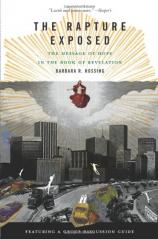Reading Group Guide
Discussion Questions
The Rapture Exposed: The Message of Hope in the Book of Revelation

1. Since no particular Bible passage uses the word "Rapture," why do so many people believe that the Bible teaches that God will snatch Christians off the face of the earth?
2. The chronology of a two-part Second Coming of Jesus and seven years of tribulation is an invention of nineteenth-century fundamentalists, not supported by traditional teaching or ancient creeds. On what basis do Rossing and most biblical scholars and Christian churches claim that Rapture theology distorts the Christian faith?
3. The book of Revelation is put forth as the source of the Left Behind books, but Rossing contends that the authors selectively pick and choose many different Bible verses and string them together to correspond with their timeline. What is the role of Daniel 9:25-27? (See pp. 25-27, 57.) What criteria can readers use to distinguish between prophecy and fiction?
4. Christians differ on what it means that Jesus will come again. Some foresee a ticking clock counting down to the end of the world: "the stroke of midnight on the doomsday clock is inevitable and even welcome." What are your first impressions of the "doomsday" scenario?
5. Rossing states that Resurrection is the foundational event for the Christian faith, and she accuses dispensationalists of "wholesale appropriation of resurrection texts for Rapture" (32). What are the implications of dispensationalists' understanding of Rapture as equivalent to Resurrection?
6. How does Rossing view the implications of Left Behind's script for the Middle East as real and threatening in our day?
7. Why do dispensationalists view Israel's founding in 1948 as the "key event" on their end-times countdown clock? In your view, is there any relationship between the "fig tree" of Matthew 24 and Israel's founding, as Hal Lindsey and others claim? What do you think about the modern state of Israel and ancient biblical prophecy?
8. Most American churches are on record in support of Israel; how does "Christian Zionism" differ from traditional Zionism? What is the role of Bible prophecy in Christian Zionism's strategy?
9. While Left Behind calls Bible prophecies "history written in advance," Rossing contends the Bible does not present a predetermined, predictive script for world events. How does the idea of prophecy as God's game-plan, filled with violence, affect attitudes on brutality and compassion in the world?
10. The author of Revelation surprises readers by presenting Jesus as a vulnerable sacrificed lamb rather than a force of violence or war. What does this reversal of roles say about power and victory? How does Revelation challenge violence and hatred with "Lamb power," the power of God's promise of hope and peace? What does a lifestyle of Lamb power look like in our world today?
11. Armageddon figures powerfully in the Left Behind story, although the word is used only once in Revelation. Why does Rossing accuse dispensationalists of "voyeurism" and "escapism" in focusing on Armageddon?
12. The Rapture scenario focuses people striving to "save" individuals before Christ returns again, in a way that historian Randall Balmer calls "a theology of despair." How do you respond to the idea that the world cannot be saved?
13. The characters in Left Behind stockpile weapons and advanced technology in an underground shelter. How does this bunker mentality contrast with Martin Luther's statement that he would plant a tree on the day before the End Times?
14. Rossing teaches that Christians always live in a tension between the "already" and the "not yet." How does this tension live in Revelation, and how does it play out in our everyday life?
The Rapture Exposed: The Message of Hope in the Book of Revelation
- Publication Date: July 6, 2005
- Genres: Christian, Religion, Spirituality
- Paperback: 240 pages
- Publisher: Basic Books
- ISBN-10: 0813343143
- ISBN-13: 9780813343143







